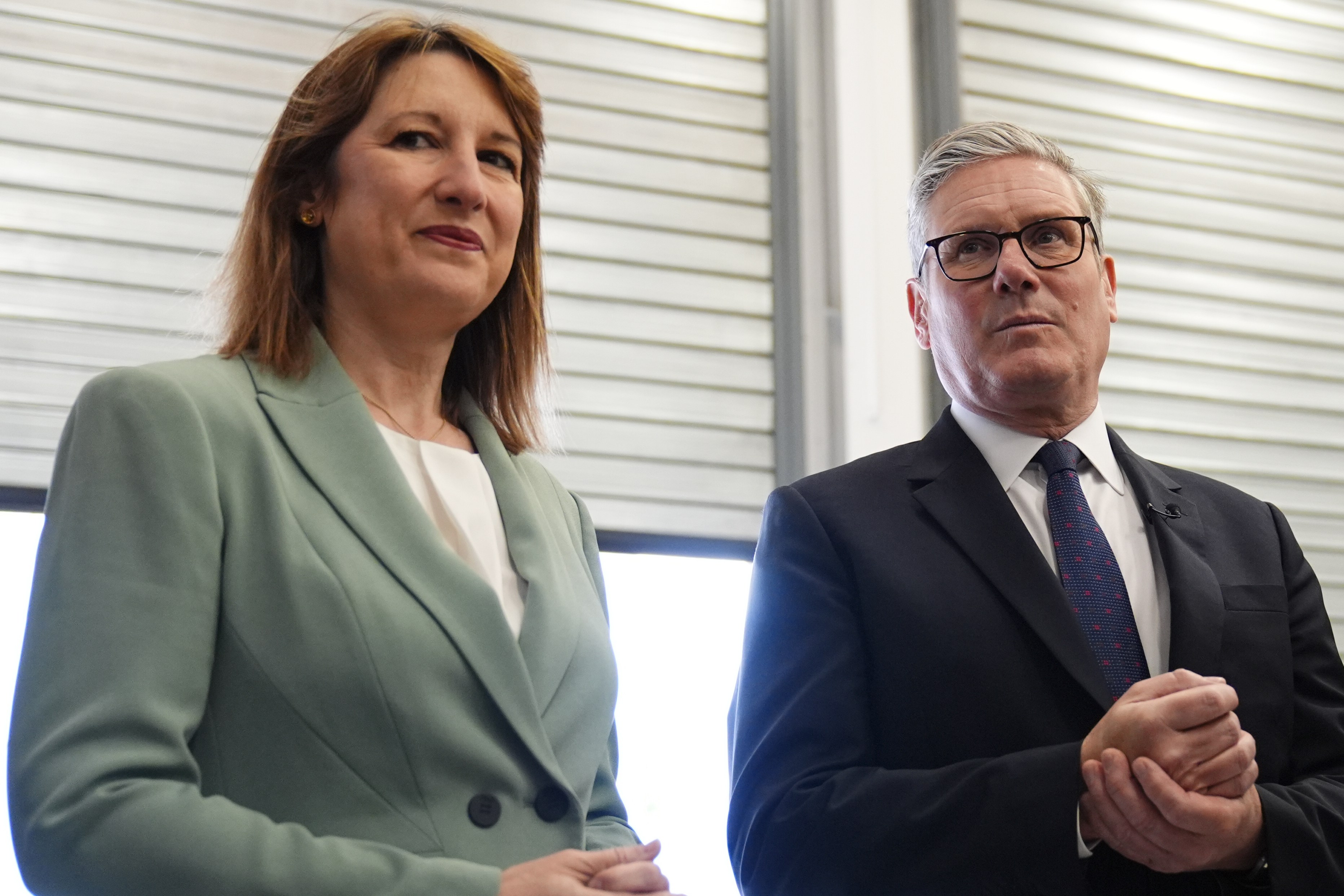When Rachel Reeves presented her first budget last year, she hoped to address the so-called “doom loop” mismanagement of more than a decade of Tory government. There will be a sense of déjà vu when she steps into the House of Commons this month for her second.
The country is still spiralling. The choice Reeves faces is simple, however unpleasant: cut spending, increase taxes, or do both, to fill the hole at the centre of our national accounts.
But if Reeves stops there, treating this budget as just another moment for clever fiscal arithmetic — a tax tinker here, a spending tweak there — she will be making a huge mistake. Her task is not simply to pull off this short-term balancing act, but to get Britain growing again — and we need a radical solution.

Rachel Reeves and Sir Keir Starmer
JACOB KING/PA
Let’s be clear: this stagnation is a catastrophe. Average real wages in Britain have not budged since the financial crisis, their worst run since the Napoleonic wars. If Britain had continued to grow after 2007 as it did before, everyone in the country would be almost £14,000 richer on average. That alternative path is not a fantasy: the US took it. But while they kept on growing, we were left far behind.
If Reeves fails to use this budget to get Britain growing again, she will soon be scrambling to make the numbers add up once more.
Before the 2024 general election Labour swore it would not increase the big taxes, but that now looks inevitable. At the end of its first year back in power the party celebrated the fact it had “fixed the foundations”, but that building work looks like a botched job as the economy continues to stagnate. Productivity is decreasing, and inflation is at 3.8 per cent.
One broken promise is an unfortunate mistake; several is a pattern. Economic events seem to be slipping out of their control.
A better growth strategy
So what must Labour do in the budget to get Britain growing again? One popular view is that it still doesn’t have a growth strategy and instead has a mishmash of policies.
This charge is unreasonable. Labour does have a growth strategy. The problem is that it does not go far enough.
At the moment the central theme, in the words of Steve Reed, the housing secretary, is “build, baby, build”. It is true that Britain today is atrocious at building. The last time we finished a nuclear power plant was 1995. We haven’t built a reservoir since 1992. The remaining rump of HS2 will still cost up to eight times more per mile than similar trains in Europe and Japan.

Steve Reed issued a call to arms for developers to “build, baby, build” when he became the housing secretary in September
DAN KITWOOD/GETTY IMAGES
We keep falling short. Labour said it would leave “no stone unturned” to build 1.5 million homes in this parliament, yet housebuilders said last week it was not going to happen.
Either way, building alone will not be enough to lift the UK out of stagnation. What we know about the causes of growth is that they have a very different origin: the world of ideas, innovation, and technological progress. Just a few weeks ago, the Nobel prize in economics was awarded to Philippe Aghion, Joel Mokyr, and Peter Howitt for explaining innovation-driven economic growth.
Innovation is why the US has soared ahead of us. It is not because they have better trains (a trip on Amtrak confirms this) but because they have a highly innovative technology sector and we do not. Take that away, and the productivity gap between the US and the EU almost entirely disappears.
William Hague captured the basic lesson well. “We need less build, build, build: more think, think, think,” he wrote in The Times. The spirit of this observation, that growth is driven by new ideas and innovation, should infuse every part of the upcoming budget.
Building must focus relentlessly on places responsible for innovation. A decision last week to invest a further £500 million in the Oxford–Cambridge corridor is exactly right. We need more of that, faster.

Starmer and Peter Kyle, the business secretary at the AstraZeneca site in Macclesfield, Cheshire
JASON ROBERTS/GETTY IMAGES
But we must go further. If we want new ideas, we have to invest in them. Britain does not do this: we invest just 2.7 per cent of our GDP in research and development, below the OECD average, and less than half that of the global leader, Israel (6.3 per cent).
At the same time, we must also rethink how we reuse existing ideas in the age of AI. This means handling intellectual property reform with the same urgency as planning reform.
In addition, we must do more to protect the most innovative parts of the economy. That life science giants such as Merck and AstraZeneca are cancelling huge investments in the UK should be treated as a national emergency in the budget. That the value of the entire FTSE 100 is less than any of the four largest US tech companies is a sign that the City, once a creative engine for the UK, needs serious reform and support.
At all costs
Above all, Labour needs to make growth a priority in this budget. And while that might sound a little obvious, it has so far chosen not to do so.
“Growth,” declared Keir Starmer at the start of 2024, “is the lever that I intend to pull.” The trouble with that line is that it makes the task at hand seem too easy. A far better metaphor is a wheel, not a lever. This captures the real, more difficult, choice: whether to steer the economy towards more growth but, at the same time, to accept that also means turning away from other things Labour believes are important.
Until now, the government has been unwilling to make that trade-off. That is what must change in this budget if stagnation is to end.
Labour is introducing new workers’ rights that will cost businesses £5 billion a year according to the government’s own analysis. But if this budget is serious about growth at all costs, it would delay these reforms — not because they don’t matter, but because ending stagnation matters more.
Labour is pursuing a net-zero agenda that is driving up energy bills, decimating traditional industries and will cost the economy a fortune. But this budget should dilute these ambitions — not because the climate is unimportant, but because this price is too high given the economic calamity unfolding.

Ed Miliband is behind Labour’s net-zero drive
PETER BYRNE/PA
Labour is protecting the pension triple lock, which the Office for Budget Responsibility expects to cost £15.5 billion a year by 2030. But if growth is the main goal, Labour would scrap this and use the savings to, for instance, fund tax cuts for small and medium-sized businesses and entrepreneurs — not because the triple lock isn’t nice, but because this money could be used in pursuit of prosperity.
Labour is failing to reform a welfare system that keeps 25 per cent of working-age people in big cities such as Birmingham, Liverpool and Blackpool on out-of-work benefits. With growth the priority, this system should be overhauled — not to save money, but because it is inefficient to condemn millions of people, full of new ideas, to worklessness.
Labour will not consider a customs union with our biggest trading partner, the EU, despite the fact that Reeves is likely to blame Brexit for the state of Britain. But if growth really is the be all and end all, then this is the moment to set out the intention to revisit that relationship. Putting the British economy first demands it.
A budget for the country (and for Labour)
But what about the politics? Did Labour, with its vast majority, not just try and fail to make very modest reforms to welfare? How could it enact any of these reforms?
This is the challenge that sits at the heart of Britain: a tension between what the economy needs and what Labour allows. Our future depends on whether the latter can find a way to win the internal battles that will allow it to do the former. And so, this budget is a crucial moment for Labour to talk frankly to its own party as well.
The budget must make clear that Labour’s titanic ambitions for the state are no longer compatible with how poor we have become. The UK, excluding London, has a GDP per capita below the poorest US state, Mississippi.
Public sector productivity has risen just 0.2 per cent a year since 1997. If the state were a private company, it would have gone bankrupt some time ago. Yet it limps on. The Labour Party must accept that radical reform is urgently required.
“Those with the broadest shoulders should pay their fair share,” Reeves has argued. Up to a point. But the budget must be honest that the UK cannot afford a generous European-style welfare state paid for with a thin US-style tax system. The direct tax burden in Britain for average earners is at a fifty-year low according to the Institute for Fiscal Studies. Labour must accept that if the state is to do more, all of us, broad and narrow-shouldered, must pay.
Finally the budget must be blunt that this is the end of the road. If Labour does not prioritise growth, if it is unwilling to give up other things that it values in its pursuit, then it is likely to end up with little at all.
My fear is that only an external crisis will force Labour to seriously change direction. My hope is that an internal crisis will happen within Labour before that. I hope that the party will come to its senses and finally see that if it does not act, if it does not turn that wheel, then it bears responsibility for whatever follows. Stagnation is a choice — and so is growth.
Daniel Susskind is the Mercers’ School memorial professor of business at Gresham College and the author of Growth: A Reckoning

